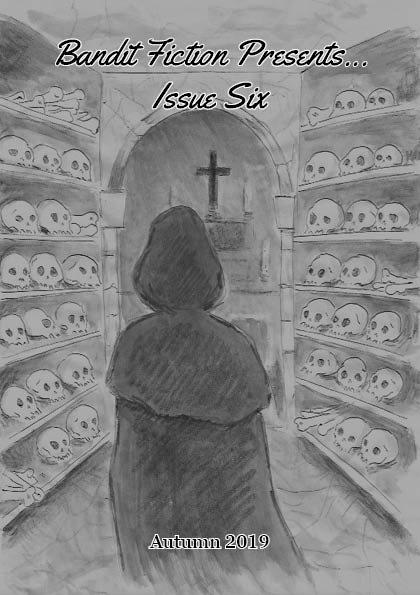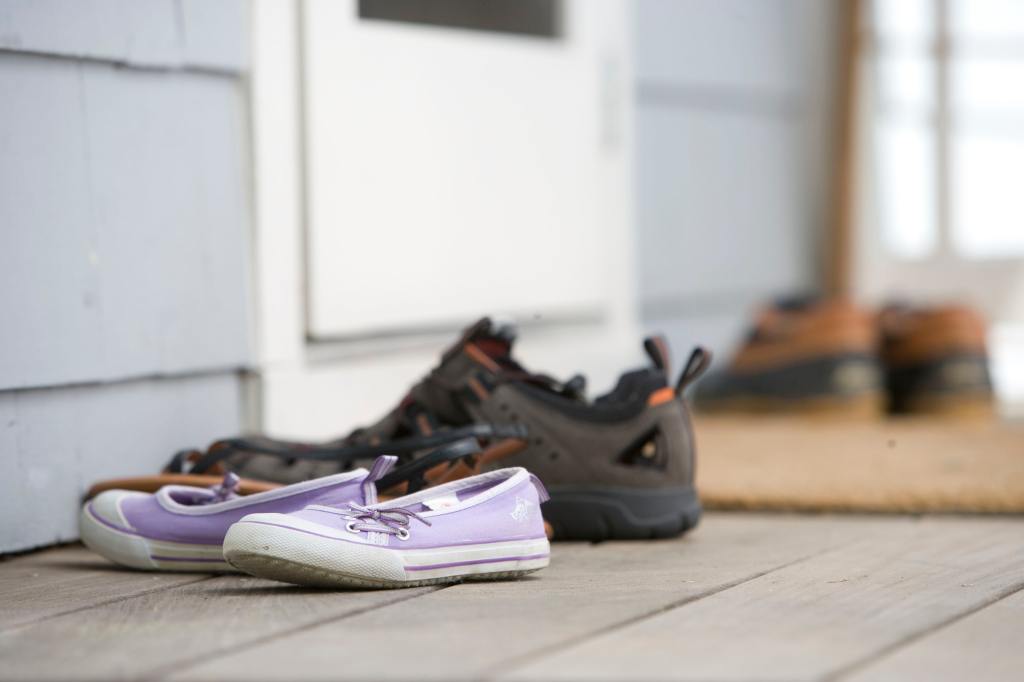
To Grow a Contradiction has been previously published by East of the Web
Melissa believed the human race could be divided into two groups. Those who have an innate desire to explore, and those who are anchored to a specific place from birth until death. She acknowledged from the outset that Anthony belonged to the former while she was entrenched in the latter. Still, she thought her pregnancy would temper his instincts, rewire him to some degree. It crushed her entirely when she opened the door one afternoon to find the house half-hollowed and a note stuck to the fridge: I’m so sorry.
From that day onward she worried not about miscarriages, birth defects or the excruciating pain of labour, but whether her son would inherit his father’s habitual longing for elsewhere. Was it inevitable that one day, 20 years in the future, she would once again open the door to a house abandoned by the prominent male in her life?
The doctor said she had never known a baby to take their first steps at such a young age. Tommy learned to totter the length of the living room rug on a Wednesday and had charted the whole house by the Friday. Once he was familiar with the house’s pathways and dead ends, he judged the realm insufficient. He pawed at the French doors and wailed when they did not swing open and grant him access to the garden and beyond. At his most wistful, he stood with his forehead pressed against the front door as he stared out the keyhole and imagined himself trotting down the hill to be swallowed by the alluring distance.
It was almost a relief to Melissa that her worst fear was confirmed so early. She could not have endured the heartbreak of a deception; a dramatic disappearance after years of pretending he was content with a life spent within the few square miles of the village. At least Tommy’s intrepid nature as an infant gave her ample time to prepare for the unavoidable.
But how is one to prepare for abandonment? To her shame, Melissa plotted a suppression of Tommy’s future. She did not think it would be possible to reverse his nature, but she may be able to grow a contradiction inside him. He would always seek new pastures, but what if he could be taught to fear his adventurous instincts? Fear of any form could prosper in the right environment given enough time. As a single parent in a lonesome house overlooking a remote village, Melissa knew such a ploy was possible.
She was not so heartless as to proceed without a numbing agent. It was easy enough to convince the doctor a mild agoraphobic burdened with an exploratory child in the wake of a separation required pharmaceutical therapy. Melissa welcomed the sedation of pills, taking a handful every morning and before bed every evening.
After this routine had been established, she began stressing the dangers of the world to Tommy: Don’t run, we could slip and crack our head open! Careful in the bath, we could drown. Make sure we chew our food properly or it’ll get wedged in our throat and we’ll choke.
This pronoun choice came naturally to her. Everything that was hers was his too, and vice versa. They shared a house, they shared a respiratory system, they shared a universe, they shared a bed.
Home-schooling allowed Melissa to restrict Tommy’s world further. She taught him spelling, maths, science. But she withheld geography (and, by extension, history) so that he grew to believe there was not much beyond the perilous river at one end of town and the desolate park at the other. Still he asked questions about the ends of this constricted cosmos: What does nothing look like? Can we go see it?
Melissa invented threats with an ever-expanding imagination. She began with the classics: zombies, vampires, ghosts. While weary of these evils, Tommy was not filled with biblical fear at the prospect of encountering one if he didn’t stay next to the trolley at the supermarket. He was interested in their appearance, their habitats, their motivations. Consequently, Melissa fabricated a beast of her own. Inspired by the warnings of a harsh and unrelenting winter, she told Tommy of an icy creature, shrouded in dirty snow and otherworldly mist, who stalked the village looking for children who foolishly strayed from their parents. So terrifying was this shadowy being, anyone who gazed upon it would die instantly from fright.
Two weeks later, when the house was encapsulated in fog, sleet scratched at the windows, and the wind bellowed morbid warnings down the chimney, Tommy’s curiosity had given way to dread. He cried at night and misheard creaks as the impending footsteps of the icy monster ascending the stairs. Melissa comforted him, telling him the creature would never enter their home so long as she was there. As long as he stayed close to her, they would be safe.
For a while, their lives were just as Melissa hoped. Such was his fear of winter, Tommy’s inquisitiveness was replaced with suspicion. Her worry (that he would one day leave her) lightened and she rediscovered the comfort of undisturbed, restorative sleep, though she did not give up the pills or even consider reducing the dosage. This partial relief meant she was less reliant on Tommy’s immediacy. She let him play with his toys in the living room while she cooked dinner. She allowed him to collect milk from the front doorstep in the mornings while she got dressed. Such offerings were welcomed by Tommy, whose valiant urges cried out from the depths of their cave.
One evening, Melissa was chopping peppers when she heard strange voices from the living room. Instinctively, she sought out the danger with knife in hand. Tommy was sat in front of the television watching a soap opera populated by actors with ghastly accents. “What are you doing?” Melissa asked as she marched toward the television to turn it off. “You know we’re not supposed to watch TV!”
“I know, Mum. Sorry.”
Melissa bent down so they were eye to eye. “If we watch TV,” she threatened, “we’ll go blind and our brain might explode. Do you understand me?”
“We won’t watch it.”
The next day, Tommy seemed preoccupied as they picked up a prescription from the pharmacy and tended to other errands. As Melissa pulled up to the house, she noticed Tommy straightening himself in his booster seat and she instinctively braced herself for a question he had percolated. “What’s a dad?”
She braked more dramatically than intended. “Where did you hear that?”
“Do we have a dad?” Tommy asked.
“You heard it from the TV, didn’t you?”
He nodded.
This post is brought to you by
Millennial Dogeater
by Marinna Benzon
Millennial Dogeater is a collection of poems that voices honest and subversive narratives of a Queer First Generation woman carefully navigating her position in America. From re-learning self-empowerment, unlearning cultural assimilation to loving the varied facets of the queer identity; Millennial Dogeater is a curated snapshot of invisible Brown Girls.

“We shouldn’t even speak about what you heard on TV. Just mentioning it will hurt our brain.” Melissa was flustered as she turned off the engine and scrambled for her bag in the back. “We’re going to get rid of it tomorrow. It’ll be best for both of us. Into the house now, quickly.”
It took Melissa a few hours to gather herself. Tommy’s question had rattled her and she sensed he was sceptical about the threat of television. She had not been able to deliver her warnings with the usual calm authority or improvised sincerity. It wasn’t until Tommy was asleep that she realised she had left her pills in the car. Not wanting to disrupt Tommy’s normal routine more than it already had been, she tiptoed out of the bedroom. With a vicious wind whipping the house, Melissa pulled on a dressing gown and shuffled into her slippers. She opened the front door and was immediately struck by a double blow; first by the cold that ripped through her dressing gown and sunk its teeth into her ribs, and secondly by the absence of her car.
Stolen? It can’t have been. Suddenly she realised Tommy’s enquiry had not only made her forget about her pills, she had forgotten to apply the handbrake!
She darted into the freezing black mist, hoping to find the car bruised against the fence. Her alarm doubled when she felt for where she was sure the fence would be only to be left clutching at nothing. The car had taken the fence with it as it rolled into the neighbouring field and who knows how far further. Desperately trying to picture the exact angle of decline, Melissa slipped into the enveloping darkness.
Sleet fell at such an angle as to target her eyes. A moment of logic blessed her and she pressed the button on her keys. Somewhere in the distance, the artificial sound of the car unlocking called out to her. She pressed the button twice more, squinting against the sleet in search of a pulsing orange beacon but the dense fog obscured everything three feet beyond her.
She staggered further, losing a slipper to a beartrap of mud. She knew the adjacent field was littered with marshes. Pressing the key button every two seconds, she attempted to follow the sound. It seemed to shift in the blackness, so much so that she changed direction dramatically after each press. Sometimes it sounded like the echo of something a mile away, sometimes the noise seemed to come from within Melissa herself.
She recalled, when they first started dating, Anthony amused Melissa with his ability to throw his voice.
Sleet turned to hail which turned to snow the likes of which Melissa had never seen. Each clump fell not with an aimless flutter, but with a sinister purpose. The increasing severity of the weather distorted her senses more each second. Realising the car would have to wait until morning – if it wasn’t buried under snow by then! – she stuffed the keys in the pocket of her sopping dressing gown and turned around. But she couldn’t see the glow of her house atop the hill. How far had she wandered? Panicked, she charged blindly uphill. She could tell from the wetness of the ground she had veered toward the marshes. While that confirmed her errant direction, it also gave her a vague reference point. She adjusted and trudged on, hoping the house’s light would suddenly sizzle into view.
In her haste, she tripped and faceplanted into a foot of near-frozen water. Struggling to her feet, she gasped as her whole body went numb. It was as if her body defiantly rejected the peril in which she was lost. Her mind, however, accepted the dire situation. Scantily clad in arctic conditions, she was lost with no sight of sanctuary. Worse still, it was possible she was moving farther from the house with every step. She felt for the keys and, despite her numb fingers’ pained protest, managed to press the button. Nothing. The mocking beep had departed the dreadful scene in search of another victim.
How long had she been gone? It could have been five minutes or an hour. Then she thought of Tommy. What if he had woken up? He would have called out for her. When there was no reply, he would have gone downstairs. Had she left the door open? He had been warned away from potential danger his whole life but Melissa couldn’t help but imagine him teetering out into the cold, his insatiable lust for freedom sensing its chance to take control.
She felt a surge of what must have been the deepest reserves of her maternal vigour. She clambered uphill, using her hands on the steeper parts, drawn to a particular route by an undefined magnetism. Suddenly she felt sure she was closing in on the house. A moment later she looked up and saw a dull yellow hue among the nothingness.
She staggered onto the drive and caught sight of her mortifying reflection in the window. Her hair was drenched and topped with a crown of snow. Mud clung to her limbs, distorting her silhouette. Her lips were blue and purple, as if they were bruised, and her skin was petrified to the point of translucency.
She saw the door was ajar and slapped her dead hand against it so it swung open and thudded into the wall. Her eyes shuddered into focus and she saw Tommy, his foot paused just above the last stair, eyes wide and mouth agape. She tried to say something but she was muted by the cold and all she could manage was a beastly gurgle.
At the sight of the icy monster before him, Tommy screamed for his mum and collapsed in fright, landing in a trembling heap at the foot of the stairs. Melissa staggered to his side and pawed at his face. His lips were already blue.
About The Author
Nicholas Elliott lives in London. In 2019 he was shortlisted for the New Writers’ Prize by #Merky Books, an imprint of Penguin. Since childhood he has been just as fascinated with the process of storytelling as the content of fiction. He has First-Class honours in Creative Writing.
Bandit Fiction is an entirely not-for-profit organisation ran by passionate volunteers. We do our best to keep costs low, but we rely on the support of our readers and followers to be able to do what we do. The best way to support us is by purchasing one of our back issues. All issues are ‘pay what you want’, and all money goes directly towards paying operational costs.






















Leave a Reply